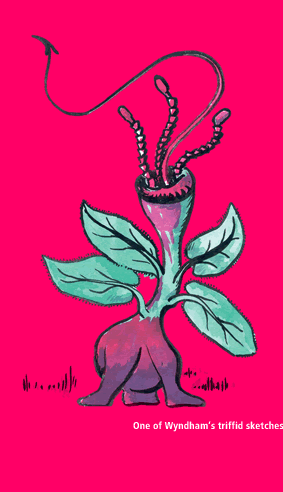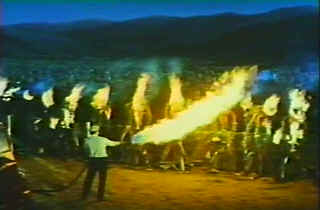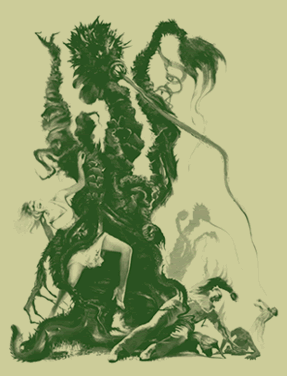July 12, 2006
on Leadership - Plants, weeds, and harnessing Stop Energy in your pet Triffid
Meredith Belbin [1] did some stunning research on teams, and postulated that there are, in good teams, 8 or 9 roles [2]:
| Shaper | Plant |  |
|---|---|---|
| Co-ordinator | Monitor Evaluator | |
| Completer-Finisher | Implementor | |
| Team Worker | Specialist | |
We know about Specialists, and our computing world is chock-full of Implementors. We can't have too many coders... Completer-finishers are like distro people, and Shapers are like visionaries. The others are more or less familiar.
It is the Plant I want to discuss today.
Sound familiar? What that little summary doesn't say is that the Plant is named after the potplant in the corner of the room, who also rarely says or does anything in the team meetings. But when they speak, they cause commotion - they stop everything.
They might have been better off naming it the Cactus. This dangerous characteristic might be what
Dave Winer calls it StopEnergy, and if so, he's partly right and partly wrong. What is going on here is that some very bright guy who cannot communicate to save his life suddenly stood up and said "*That Won't Work!*" What's more, he's likely very offended at the very notion that it was suggested...
In teams within normal humanity (that is, non-computing), Plants are a rarer form of life, less of a worry, but in computing, this garden grows with bounty. So when Belbin above suggests "Too many Plants in one organisation, however, may be counter-productive as they tend to spend their time reinforcing their own ideas and engaging each other in combat" you can see how the computing garden starts to resemble the Day of the Triffids.
Now, your first impression might be to pump up the DDT can and go on a nature clearing ... but wait! What Belbin suggested -- strongly -- was that the good teams had one of every of the above roles. Including the Plant! Prickly, cactus-like, tripodal, full of StopEnergy, however you like to characterise him, the Plant performs a very valuable role: He stops the group going down a doomed path. Only the Plant has the breadth, the depth, the experience, the technical know-how, the empathy with the very soil of the mission and the arrogance to see in an instant that whatever had grabbed the delicious attention of the rest ... was nonsense.

Sadly, the Plant can't communicate. He has to argue, to cause chaos, to attack, to not budge. Which is why you really hope there is only one in the room, and sometimes you feel like the only answer is destructive.
But after all that, consider the complexity of systems: before it works how many of you know it will? The Plant knows it won't, and frankly, the statistics are on his side. That's because so much of what the rest of us do is to grasp at marketing hype, the buzzwords of the month, the framework of the quarter, and how to re-energise the perpetual energy of the faithful. More faith, we cry! "You're an idiot," the Plant helpfully says...
What we don't do is go back to first principles and work out what works. The Plant does, and he's sometimes brave enough to stand up and go against the flow.
How then to handle the Plant is a task of deep and extreme interest to the leader of computing teams. He cares for the mission, even if he offends with every word. The rest of the group needs to be aware that when a true Plant speaks up, it's time to listen, not be offended. Go the extra distance to water that garden. When the Plant speaks, be aware. Beware.

But the rest of the team also need to create. We also need to move forward! The Plant won't give us the ideas, the team has to build them, only to have them knocked down by the Plant. So engaging the Plant, and keeping him at an appropriate, distanced but familar and inclusive attitude is critical to utilising him. We therefore do not glorify the Plant's role, rather we recognise it and look to help the Plant to develop the social skills to bring his perspective to the table. And look to creating the space within the team to let the Plant send out his early warning signals.
Of course, this all is no easy thing. True plants mingle with true weeds, and to the inexperienced gardener, they are indistinguishable. Belbin suggested that as much as 30% of a team are make-weights, and I wrote earlier about the RTFM factor and how it pervades our world. Unfortunately, it takes far less skill to repeat "RTFM" and pretend to be a Plant than it does to really acquire those deep and broad skills. Frankly, there are far more weeds in our tech garden, and our need as leader is to determine who has a long and productive record of growth, and who just messes up the garden. C.f. Belbin's comment above about multiple Plants. You may now be wondering whether we are talking about StopEnergy or instead, the Loner, as introduced by Mitchell.
| As leader it is your job to find out. |  |
Why do I write all this? With such conviction? Of course, because I am a Plant. The Plant, even, when it comes to certain interests of user security. The Belbin tests pegged me as a natural triffid, and led me on to the next step: strengthening the other characteristics. These days, I spend most of my free time on projects where I cannot be the Plant, so I must adopt other roles. (Today, that of a Coordinator. It's a non-techie mission, and we have our full compliment of Plants already. We have our Resource Investigator and Shaper, we sorely lack Implementors, but I'm conflicted in that.)
Which brings us back full circle to my original claim - that leaders adopt the roles that others cannot do, appreciating their team members for the roles that they can and do fill.
Now, I don't claim to be a leader, let alone a good leader. I claim to be knowledgeable in it, and capable of spotting one when I see one. I can step aside when someone better comes along, or I can fill in the gaps, albeit in a 3-legged vegetarian sort of fashion.

The gap I'd like to point out today is that the Plants are a great help. Indeed, Belbin says critical. I won't push the point that all Plants are critical all the time, rather I'll agree with Frank:
I believe that dissidents can play a critical role in ensuring a projectís health in the long term, however annoying they might be in the near term.
You the leader need to water this garden, and you can do so firstly with an understanding of roles, secondly with a good understanding of negotiation, and finally, you also need a sense of avoiding the weeds, who latter might be the StopEnergy mentioned earlier. (For that latter, you need technical knowledge and patience, sorry.)
This task is doubly hard as the Plant will respond in a bad way if you treat him badly, thus confusing the signals. But underneath, he really wants to be your early warning device, and he can be harnessed as such, if you're ready and prepared for him.
Notes on Belbin: 1. Unfortunately Belbin is a sold product but there appear to be some Books. On their site you can see various ways to buy the product. Disclosure: I have nothing to do with them, I just went through their process at b-school.
2. It was 8, then it was 9! Posted by iang at July 12, 2006 10:36 PM | TrackBack
Glad to see you made the connection between your comments on "plants" and what I was trying to get at :-)
Posted by: Frank Hecker at July 12, 2006 05:19 PM